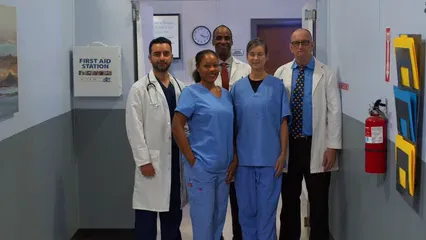Introduction
In the vibrant heart of the Memphis Metropolitan Statistical Area (MSA), healthcare professionals are not just keeping the region healthy—they’re shaping its future. With a rich history and a diverse population, Memphis serves as a unique case study for healthcare statistics that can inform best practices and strategies across the country.
The Memphis MSA, which encompasses parts of Tennessee, Mississippi, and Arkansas, boasts a population exceeding 1.3 million. This diverse demographic landscape presents both opportunities and challenges for healthcare providers. Understanding the statistics surrounding healthcare employment, wages, demographics, and health outcomes in Memphis is crucial for professionals in the field.
As we navigate through these insights, we will uncover essential information that can help healthcare practitioners tailor their services to meet the unique needs of the community. From the median wages for various healthcare roles to the leading health challenges, this blog post will equip you with the knowledge to thrive in this dynamic environment.
Healthcare professionals in Memphis are faced with a fast-evolving landscape. The city is home to numerous hospitals, clinics, and healthcare organizations, creating a complex ecosystem that requires continuous adaptation and learning. With the prevalence of chronic diseases and health disparities, understanding local health statistics can lead to improved patient outcomes.
So, gear up as we crunch some numbers and explore what they mean for you! Whether you’re a seasoned professional or just starting your healthcare journey, this data will provide valuable insights that can enhance your practice and community impact. Let’s dive into the intricate web of healthcare statistics that define the Memphis MSA.

Summary
In the Memphis MSA, healthcare professionals are navigating a landscape characterized by growth opportunities and significant challenges. With a population of over 1.3 million, Shelby County is the largest in Tennessee, presenting a substantial market for healthcare services. This article will cover essential statistics such as median wages for healthcare occupations, employment trends, and health outcomes that are crucial for healthcare professionals in this area.
Key points include:
- The median hourly wage for healthcare practitioners in Memphis is approximately $44.14, with specific roles like Nurse Anesthetists earning as much as $89.84.
- The employment landscape is diverse, with the healthcare sector representing a significant portion of the local economy.
- Demographic insights reveal a population with varying health needs that directly influence healthcare delivery.
- Leading causes of death and health challenges, such as obesity and diabetes, provide critical context for healthcare professionals.
By understanding these statistics, healthcare professionals can better tailor their services to meet the needs of the Memphis community. The task is not just about treating patients; it’s about anticipating their needs and addressing public health challenges head-on.
This knowledge equips healthcare professionals to advocate for policies and programs that can effectively address the pressing health concerns of the Memphis population. By leveraging these insights, practitioners can enhance their services, contribute to the community’s well-being, and ultimately shape a healthier future for Memphis.

Healthcare Employment Statistics in Memphis
Overview of Healthcare Occupations
The Memphis Metropolitan Statistical Area (MSA) is a bustling hub for healthcare professionals. With over 39,480 healthcare practitioners, the region is teeming with opportunities. From doctors to nurses, the range of roles is impressive. Practitioners include physicians, nurse anesthetists, physical therapists, and many more.
Let’s not forget the support roles, which are equally vital. Approximately 16,820 healthcare support occupations exist in Memphis. These roles include medical assistants, pharmacy aides, and phlebotomists. Each position plays a critical role in ensuring that the healthcare system runs smoothly.
Nurse anesthetists lead the pack in terms of earnings, raking in a median wage of $89.84 per hour. Physical therapists follow with a respectable median wage of $48.18. On the support side, medical assistants earn a median hourly wage of around $17.78.
If you’re considering a career in healthcare, make sure you have the right tools to succeed. A Healthcare Professional Scrubs Set is essential for any aspiring healthcare worker. Comfortable and stylish, these scrubs ensure you look professional while feeling your best during those long shifts.
The healthcare job market in Memphis is diverse and dynamic. It caters to various levels of expertise and specialties. With hospitals, clinics, and specialty care facilities, the opportunities are plentiful.
As the population grows, so does the demand for healthcare services. Educational institutions are stepping up, producing skilled professionals to meet the needs of the community. The healthcare sector is a significant contributor to Memphis’s economy, providing jobs and essential services.

Wage Analysis
Healthcare professionals in Memphis enjoy a range of wages, reflecting the diversity of roles. The median hourly wage for healthcare practitioners stands at approximately $44.14. This figure is slightly below the national average of $47.15. However, the potential for high earnings exists.
For instance, nurse anesthetists are among the highest-paid roles, making up to $89.84 per hour. Anesthesiologists, while fewer in number, earn a staggering median wage of $168.87 per hour. This showcases the lucrative potential within specialized fields.
Comparatively, support roles earn less. Medical assistants have a median hourly wage of around $17.78. Pharmacy aides earn about $17.66, while phlebotomists take home around $17.78.
While the wages may be lower for support occupations, they are critical to the healthcare system. They ensure that practitioners can focus on patient care, thus enhancing overall service delivery.

Don’t forget to keep your skills sharp! A Medical Assistant Reference Guide is a great resource to have on hand. It’s packed with essential information that can help you navigate the complexities of patient care and administrative duties.
The wage landscape in Memphis reflects the need for competitive salaries to attract and retain talent. Healthcare organizations are continually reviewing compensation packages to stay appealing to prospective professionals.
Employment Trends and Projections
The healthcare sector in Memphis is on an upward trajectory. Job growth rates for healthcare professionals are projected to be robust in the coming years. The demand for services is expected to rise, driven by an aging population and increasing chronic health issues.
Specifically, telehealth roles are gaining traction, with a significant push toward remote healthcare delivery. This shift has opened new avenues for healthcare professionals, allowing for flexibility and accessibility in patient care.
Additionally, geriatric care is emerging as a vital area. With a growing senior population, the need for specialized services is escalating. The workforce will need to adapt, focusing on skills tailored to this demographic.
Overall, the trends indicate a bright future for healthcare employment in Memphis. Professionals can anticipate growth, new roles, and opportunities in innovative healthcare delivery systems. As the landscape evolves, so too will the skills and roles required to meet the community’s health needs.

Demographics of the Memphis Metropolitan Area
Population Breakdown
The Memphis Metropolitan Statistical Area (MSA) is a vibrant and diverse region. As of the latest U.S. Census data, the MSA has a population of approximately 1.3 million residents. That’s quite a few people, right? Let’s break down the demographics a bit.
The racial composition reveals a rich tapestry of backgrounds. About 53.9% of the population identifies as Black or African American, while 38% is White. The remaining 8% comprises other races, including Hispanic or Latino individuals, who make up approximately 6.4% of the total. This diversity is not just numbers; it reflects the cultural richness of Memphis, from its music scene to its culinary offerings.
When it comes to age, the median age in the Memphis MSA is around 35.7 years. About 25% of the population is under 18, which means there’s a youthful spirit in the air! Meanwhile, 61% fall into the 18-64 age bracket, and 14% are aged 65 and older. This age distribution presents unique challenges and opportunities for healthcare professionals. Younger populations may need preventive care, while older adults often require more specialized services.
Socioeconomic factors also play a crucial role in shaping the health landscape. The median household income in the area is around $52,092, which is slightly below the national average. Unfortunately, 19% of residents live below the poverty line, and this figure rises to 30% for children under 18. Such economic disparities can significantly influence health outcomes, making it essential for healthcare providers to tailor their services accordingly.
Understanding these demographic dynamics is vital for healthcare professionals. They must consider the diverse needs and challenges faced by different populations in their practices. In a place like Memphis, where the community is as colorful as its history, knowing your audience is half the battle.

Social Determinants of Health
Social determinants of health are the conditions in which people are born, grow, live, work, and age. In the Memphis MSA, these factors significantly impact health outcomes. Let’s take a closer look at the statistics that reveal the region’s health landscape.
Poverty rates are a major concern. Approximately 19% of the population lives below the poverty line, which can have dire consequences for health access and outcomes. Low-income families often face barriers to healthcare, which can lead to higher rates of chronic diseases and a lack of preventive care.
Education is another vital determinant. About 66.6% of residents have at least a high school diploma, while only 22.4% hold a bachelor’s degree or higher. Education often correlates with health literacy, influencing individuals’ ability to access and understand healthcare information. A more educated population typically has better health outcomes, so this gap is noteworthy.
Health insurance coverage is equally crucial. In the Memphis area, 11.5% of residents lack health insurance. This statistic is concerning, as uninsured individuals often delay seeking care, leading to worse health outcomes. Access to quality healthcare should not be a privilege; it should be a right.
These social determinants highlight the complexities faced by healthcare professionals in Memphis. Addressing health disparities requires more than just treating illnesses; it demands a holistic approach that considers socioeconomic factors, education, and access to healthcare. By understanding these determinants, healthcare providers can better serve the diverse Memphis community and work towards improving overall health outcomes.

Health Outcomes and Challenges in Memphis
Leading Causes of Death
In Memphis, understanding the leading causes of death is crucial for healthcare providers. The statistics reveal a pressing need for targeted healthcare strategies. Heart disease is the top culprit, accounting for 21.8% of total deaths. In real numbers, that’s a staggering 6,065 lives lost. This condition is often linked to lifestyle choices and emphasizes the need for prevention programs focusing on diet and exercise.
Next in line is cancer, claiming 4,997 lives, or 18% of deaths in the area. The varying types of cancer require specialized treatment facilities and increased awareness campaigns. COVID-19, the unwelcome guest in our lives, added 952 deaths to the toll in 2020 alone. This highlights the importance of vaccinations and public health measures to curb the spread of infectious diseases.
Cerebrovascular disease, which includes strokes, follows with 5.2% of deaths. Unintentional injuries account for 7%, a statistic that brings attention to the need for safety initiatives. Finally, chronic lower respiratory diseases, such as COPD, contribute to 3.7% of deaths. This information provides healthcare professionals with insights into the pressing health issues in Memphis.
For healthcare providers, these statistics are not just numbers. They represent lives and the necessity for effective healthcare strategies to combat these leading causes of death. By focusing on prevention, early detection, and appropriate care, healthcare professionals can make a significant impact on these alarming statistics.

Health Initiatives and Public Health Challenges
In response to health challenges, Memphis has launched several public health initiatives. The city is grappling with obesity rates that hover around 40% among adults. This alarming figure has prompted community health programs aimed at promoting healthier lifestyles. Initiatives include local farmers’ markets, nutrition education, and exercise programs designed to get residents moving.
Diabetes is another significant concern, affecting a substantial portion of the population. The prevalence of diabetes necessitates ongoing education and screening programs. Healthcare providers are stepping up to address this issue by offering resources for managing diabetes and promoting regular check-ups.
Community health programs play a vital role in improving health outcomes. Initiatives like the “Healthy Shelby” program focus on increasing physical activity and access to nutritious foods in underserved areas. These programs aim to create an environment that supports healthy living.
Moreover, the COVID-19 pandemic highlighted the need for robust public health responses. Surveillance systems are now in place to monitor potential spikes in cases. This proactive approach enables healthcare providers to respond swiftly to emerging health threats.
Memphis faces unique health challenges, but the commitment to public health initiatives is evident. By addressing conditions such as obesity and diabetes head-on, healthcare providers can foster a healthier community. Through collaborative efforts, Memphis aims to improve health outcomes and create a supportive environment for its residents.

FAQs
What are the most in-demand healthcare professions in Memphis?
In Memphis, the demand for healthcare professionals is on the rise. Nurse Practitioners lead the charge, as they offer essential services in primary and specialty care. Their role has become increasingly important due to the growing population and rising healthcare needs. Physical Therapists are also in high demand, helping patients regain mobility and recover from injuries. Additionally, healthcare support roles are crucial. Medical Assistants and Phlebotomists are vital for the smooth operation of clinics and hospitals. Their contributions ensure that healthcare practitioners can focus on patient care, making them indispensable to the system. Overall, the demand for skilled healthcare professionals in Memphis is robust, providing numerous opportunities for those entering the field.
How do Memphis healthcare wages compare to national averages?
When comparing wages in Memphis to national averages, the figures tell an intriguing story. The median hourly wage for healthcare practitioners in Memphis sits at around $44.14, somewhat lower than the national average of $47.15. However, certain roles, like Nurse Anesthetists, stand out with a competitive wage of approximately $89.84 per hour. Support roles, while essential, typically offer lower compensation. For instance, Medical Assistants earn about $17.78 per hour. Despite these disparities, the local healthcare market remains dynamic. As demand grows, there may be upward pressure on wages, particularly in high-demand specialties. Understanding these wage dynamics can help healthcare professionals make informed career choices, ensuring they seek roles that align with their financial and professional aspirations.
What resources are available for healthcare professionals in Memphis?
Healthcare professionals in Memphis have access to a variety of resources. Local organizations, such as the Greater Memphis Medical Society, provide networking opportunities and professional development. These connections can be invaluable for career advancement and staying updated on industry trends. Continuing education programs are also available through local universities and colleges. Institutions like the University of Tennessee Health Science Center offer specialized training. These programs help professionals enhance their skills and stay competitive in the evolving healthcare landscape. Additionally, community health initiatives often seek partnerships with healthcare practitioners. Engaging with these programs can not only fulfill community needs but also provide professionals with a rewarding experience.
How can healthcare professionals address the unique health challenges in Memphis?
To effectively tackle the unique health challenges in Memphis, healthcare professionals can implement several strategies. Community outreach is key. By organizing health fairs and educational workshops, they can raise awareness about prevalent health issues, such as obesity and diabetes. Partnerships with local organizations can amplify these efforts. Collaborating with schools, churches, and community centers allows for broader outreach and resource sharing. Providing tailored care strategies that consider the cultural and socioeconomic factors affecting health outcomes is also essential. Lastly, advocating for public health policies that prioritize preventive care can lead to significant improvements. By focusing on community health and wellness, healthcare professionals can help create a healthier Memphis for all its residents.
Please let us know what you think about our content by leaving a comment down below!
Thank you for reading till here 🙂
And remember, whether you’re prepping for a long shift or just getting your day started, having the right gear can make all the difference. Consider investing in a reliable Stethoscope that you can trust for accurate readings. It’s a healthcare essential that every professional should have in their toolkit!
Staying healthy is also crucial in this field! A Fitness Tracker can help you monitor your activity levels, making it easier to stay fit while working those demanding shifts!
And don’t forget to hydrate! A Water Bottle with Time Marker is a great way to track your water intake throughout the day. Staying hydrated is key to maintaining your energy levels!
For those moments when you need to unwind, consider using an Essential Oil Diffuser to create a calming atmosphere at home after a long day of work. Aromatherapy can do wonders for stress relief!
For those interested in a more active lifestyle, a set of Resistance Bands can be a versatile addition to your home workout routine. They’re perfect for strength training and can be used almost anywhere!
After your workout, don’t skip stretching! A Foam Roller can help relieve muscle tension and improve flexibility.
And if you’re a coffee lover, a Premium Coffee Maker can brew your favorite cup to kickstart your day!
Finally, if you enjoy cooking healthy meals, a Cookware Set is essential for whipping up nutritious dishes quickly and easily!
All images from Pexels




